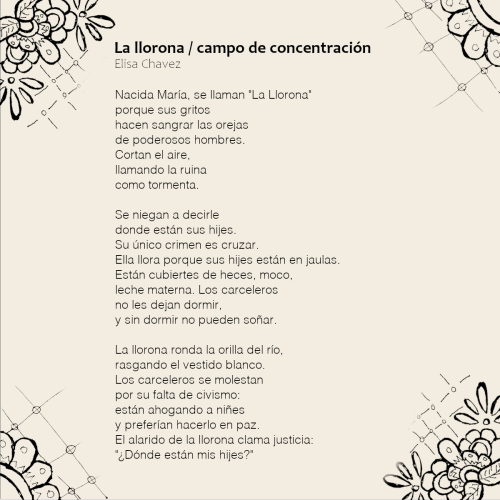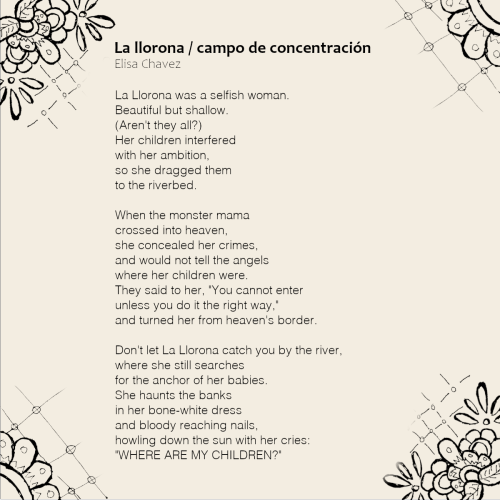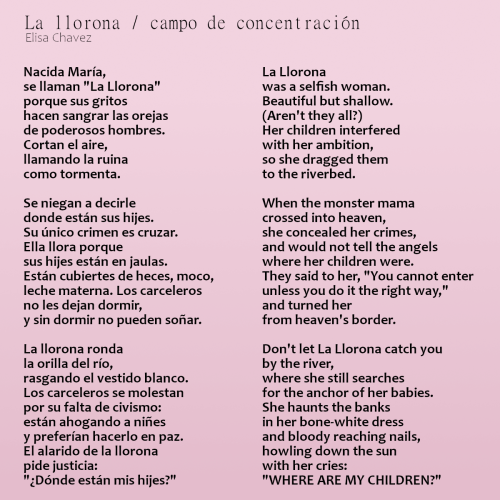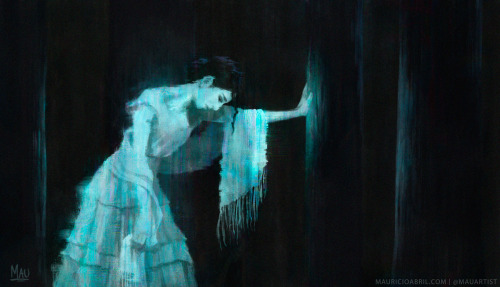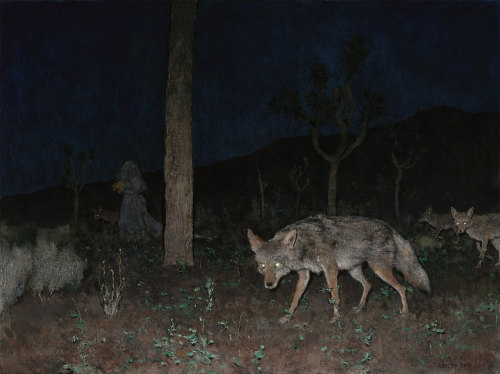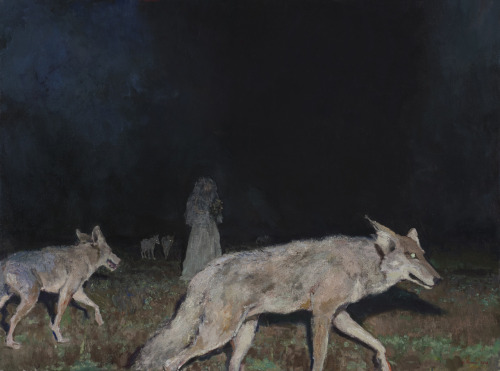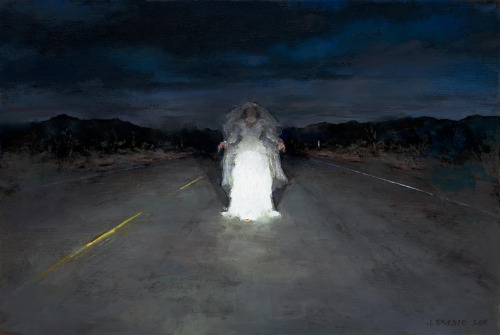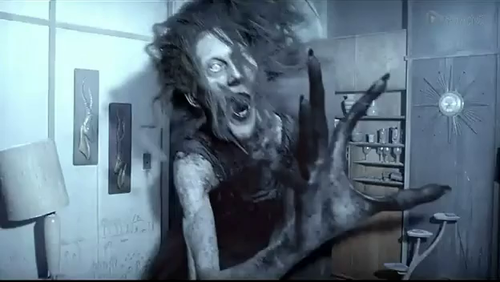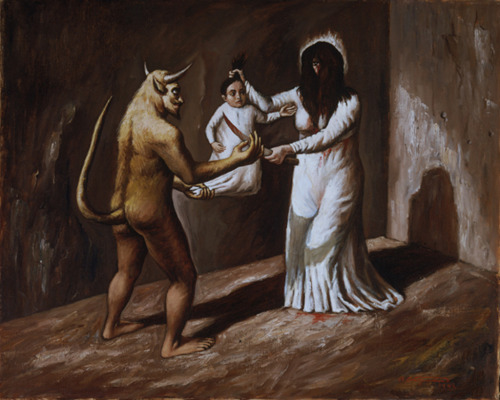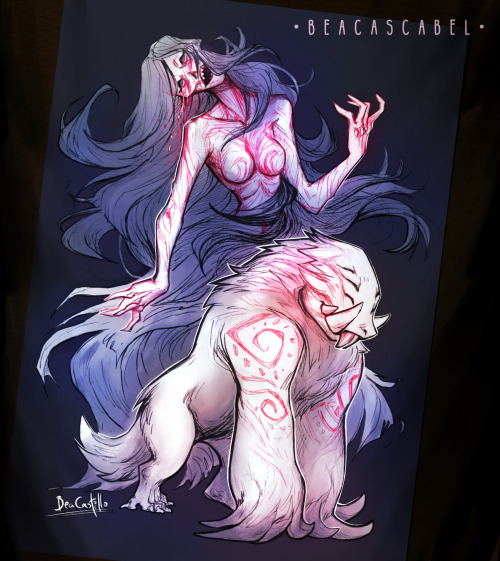#la llorona
La llorona / campo de concentración
Elisa Chavez
Nacida María, se llaman “La Llorona"
porque sus gritos
hacen sangrar las orejas
de poderosos hombres.
Cortan el aire,
llamando la ruina
como tormenta.Se niegan a decirle
dónde están sus hijes.
Su único crimen es cruzar.
Ella llora porque
sus hijes están en jaulas.
Están cubiertes de heces, moco,
leche materna. Los carceleros
no les dejan dormir,
y sin dormir no pueden soñar.La llorona ronda la orilla del río,
rasgando el vestido blanco.
Los carceleros se molestan
por su falta de civismo:
están ahogando a niñes
y preferían hacerlo en paz.
El alarido de la llorona clama justicia:
“¿Dónde están mis hijes?”La Llorona was a selfish woman.
Beautiful but shallow.
(Aren’t they all?)
Her children interfered
with her ambition,
so she dragged them
to the riverbed.When the monster mama
crossed into heaven,
she concealed her crimes,
and would not tell the angels
where her children were.
They said to her, “You cannot enter
unless you do it the right way,”
and turned her from heaven’s border.Don’t let La Llorona catch you by the river,
where she still searches
for the anchor of her babies.
She haunts the banks
in her bone-white dress
and bloody reaching nails,
howling down the sun with her cries:
“WHERE ARE MY CHILDREN?”
(Alternative design/format here.)
Born María, they are called “La Llorona”*
because her screams
Make the ears of
powerful men bleed.
They cut through the air,
calling the ruin
a thunderstorm.*
They refuse to tell her
Where her children are.
Her only crime is crossing.
She cries because
her children are in cages.
They are covered with scum*, snot,
breast milk. The jailer
doesn’t let them sleep,
and without sleep they can not dream.
La Llorona runs along the river bank,
tearing the white dress.
The jailers are bothered
by her lack of civility:
They are drowning children
and preferred to do so in peace.
The shrieks of La Llorona cry out for justice:
“¿Dónde están mis hijes?”*
spanish translation into english (I am not fluent in spanish nor am i a translator)
* I didn’t translate La LLorona because I thought that the author was using it as a title for the woman this poem is about. It’s a reference to a Latine American folktale and translates directly as the weeping woman.
*this sentence gave me some difficulty so if anyone has alternate ideas on how to translate it please lmk
*this word heces couldve been translated as feces but that seemed to formal imo & i liked the alliteration*didnt translate the last line bc imo the woman in this poem is Latine and would be speaking spanish, translated it means “Where are my children?”
Post link
La llorona / campo de concentración
Elisa Chavez
Nacida María, se llaman “La Llorona"
porque sus gritos
hacen sangrar las orejas
de poderosos hombres.
Cortan el aire,
llamando la ruina
como tormenta.
Se niegan a decirle
dónde están sus hijes.
Su único crimen es cruzar.
Ella llora porque
sus hijes están en jaulas.
Están cubiertes de heces, moco,
leche materna. Los carceleros
no les dejan dormir,
y sin dormir no pueden soñar.
La llorona ronda la orilla del río,
rasgando el vestido blanco.
Los carceleros se molestan
por su falta de civismo:
están ahogando a niñes
y preferían hacerlo en paz.
El alarido de la llorona clama justicia:
“¿Dónde están mis hijes?”
La Llorona was a selfish woman.
Beautiful but shallow.
(Aren’t they all?)
Her children interfered
with her ambition,
so she dragged them
to the riverbed.
When the monster mama
crossed into heaven,
she concealed her crimes,
and would not tell the angels
where her children were.
They said to her, “You cannot enter
unless you do it the right way,”
and turned her from heaven’s border.
Don’t let La Llorona catch you by the river,
where she still searches
for the anchor of her babies.
She haunts the banks
in her bone-white dress
and bloody reaching nails,
howling down the sun with her cries:
“WHERE ARE MY CHILDREN?”
(Alternative design/format here.)
Post link
La llorona / campo de concentración
Elisa Chavez
Nacida María,
se llaman “La Llorona"
porque sus gritos
hacen sangrar las orejas
de poderosos hombres.
Cortan el aire,
llamando la ruina
como tormenta.Se niegan a decirle
dónde están sus hijes.
Su único crimen es cruzar.
Ella llora porque
sus hijes están en jaulas.
Están cubiertes de heces, moco,
leche materna. Los carceleros
no les dejan dormir,
y sin dormir no pueden soñar.La llorona ronda
la orilla del río,
rasgando el vestido blanco.
Los carceleros se molestan
por su falta de civismo:
están ahogando a niñes
y preferían hacerlo en paz.
El alarido de la llorona
clama justicia:
“¿Dónde están mis hijes?”La Llorona
was a selfish woman.
Beautiful but shallow.
(Aren’t they all?)
Her children interfered
with her ambition,
so she dragged them
to the riverbed.When the monster mama
crossed into heaven,
she concealed her crimes,
and would not tell the angels
where her children were.
They said to her, “You cannot enter
unless you do it the right way,"
and turned her
from heaven’s border.Don’t let La Llorona catch you
by the river,
where she still searches
for the anchor of her babies.
She haunts the banks
in her bone-white dress
and bloody reaching nails,
howling down the sun
with her cries:
"WHERE ARE MY CHILDREN?”
Good morning everybody! This is an old-new poem, first published last year in Miss Translated: A Benefit for the New Sanctuary Coalition. Today I present it to you featuring hopefully-more-legible-typeface! colors??? and, as ever, a grammar mistake I noticed at the very last minute. Don’t forget to abolish ICE! Besos a todes.
Post link
La llorona / campo de concentración
Elisa Chavez
Nacida María,
se llaman “La Llorona"
porque sus gritos
hacen sangrar las orejas
de poderosos hombres.
Cortan el aire,
llamando la ruina
como tormenta.
Se niegan a decirle
dónde están sus hijes.
Su único crimen es cruzar.
Ella llora porque
sus hijes están en jaulas.
Están cubiertes de heces, moco,
leche materna. Los carceleros
no les dejan dormir,
y sin dormir no pueden soñar.
La llorona ronda
la orilla del río,
rasgando el vestido blanco.
Los carceleros se molestan
por su falta de civismo:
están ahogando a niñes
y preferían hacerlo en paz.
El alarido de la llorona
clama justicia:
"¿Dónde están mis hijes?”
La Llorona
was a selfish woman.
Beautiful but shallow.
(Aren’t they all?)
Her children interfered
with her ambition,
so she dragged them
to the riverbed.
When the monster mama
crossed into heaven,
she concealed her crimes,
and would not tell the angels
where her children were.
They said to her, “You cannot enter
unless you do it the right way,"
and turned her
from heaven’s border.
Don’t let La Llorona catch you
by the river,
where she still searches
for the anchor of her babies.
She haunts the banks
in her bone-white dress
and bloody reaching nails,
howling down the sun
with her cries:
"WHERE ARE MY CHILDREN?”
Good morning everybody! This is an old-new poem, first published last year in Miss Translated: A Benefit for the New Sanctuary Coalition. Today I present it to you featuring hopefully-more-legible-typeface! colors??? and, as ever, a grammar mistake I noticed at the very last minute. Don’t forget to abolish ICE! Besos a todes.
Post link
So is no one going to talk about how that one amazing song La Llorona from CoCo is actually a real song? This is the original.
Actually, La Llorona is a popular mexican song with an unknown original author. It’s as old as 1850~ and has so many versions (around 500) that many are really popular.
Chavela Vargas, Eugenia León, Susana Harp and many others have their own versions of the song.
This one (by Ángela Aguilar) is one of the most recent and popular ones just like the one from the movie.

a weeping woman’s lullaby

La Llorona
Happy Halloween! I made another more detailed description on my Instagram ⬇️ https://www.instagram.com/p/CHA64aUJ3pQ/?igshid=1ta5068faa7do
Ver “La Llorona” en YouTube
This month’s project theme for our discord server was Urban Legends so I went with La Llorona as this idea popped in my head. Not my best work whatsoever, but I wanted to do it and tried my best either way.
Post link

